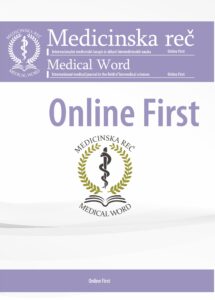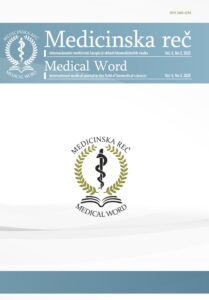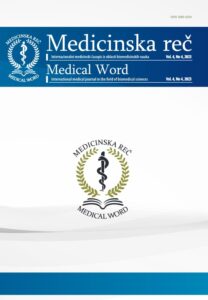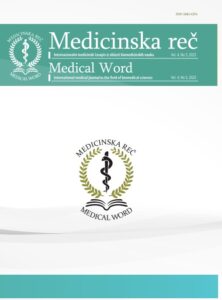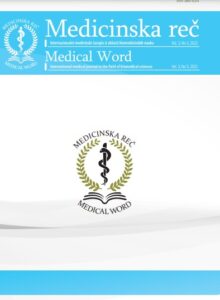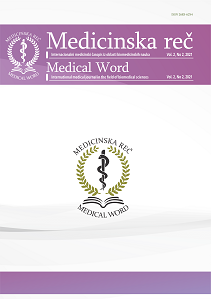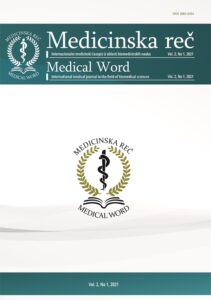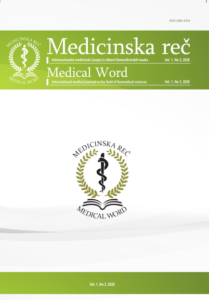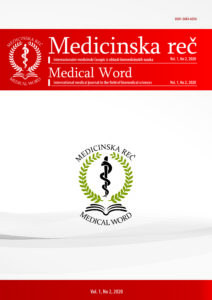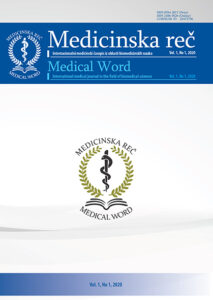The Relationship between Personality Traits and Job Satisfaction among Healthcare Professionals: a Comparative Analysis of Personality and Occupational Satisfaction
Review article
Marina Kostić
72–78
https://doi.org/10.5937/medrec2502072K
Apstrakt
Job satisfaction is recognized as one of the key indicators of mental health and professional efficacy in the healthcare sector. Physicians, specialists, nurses, and clinical technicians represent some of the most frequently examined populations in psychological research on personality, occupational stress, job satisfaction, and burnout, due to their frequent exposure to emotionally demanding and high-responsibility work environments. Given the intense demands, elevated accountability, and the inherently stressful nature of their roles, healthcare professionals face complex emotional, cognitive, and interpersonal challenges, making the understanding of factors contributing to job satisfaction particularly significant. The aim of this review paper is to examine the association between personality traits and professional satisfaction among healthcare professionals through an analysis of contemporary theoretical models, relevant scientific publications, and empirical findings. Special emphasis is placed on individual differences in personality characteristics and their influence on perceptions of the work environment, quality of interpersonal relationships, and the subjective experience of professional purpose. Findings from recent studies suggest that traits such as emotional stability, conscientiousness, and openness to experience are positively associated with higher levels of job satisfaction, whereas traits like neuroticism are predictive of professional dissatisfaction and occupational burnout. This paper synthesizes data from international studies conducted in diverse clinical and hospital settings, with the goal of identifying and comparing dominant patterns in the relationship between personality traits and subjective professional well-being. In conclusion, the paper discusses implications for personnel selection, the development of psychological support systems, and the design of organizational interventions aimed at promoting job satisfaction and safeguarding the mental health of healthcare professionals.
Key words: healthcare professionals, personality traits, job satisfaction, occupational burnout, psychological factors
References
- Lu H, Zhao Y, While A. Job satisfaction among hospital nurses: A literature review. Int J Nurs Stud 2019;94:21-31.
- Shanafelt TD, Noseworthy JH. Executive Leadership and Physician Well-being: Nine Organizational Strategies to Promote Engagement and Reduce Burnout. Mayo Clin Proc 2017;92(1):129-46.
- Maslach C, Leiter MP. Understanding the burnout experience: recent research and its implications for psychiatry. World Psychiatry 2016;15(2):103-11.
- Judge TA, Heller D, Mount MK. Five-factor model of personality and job satisfaction: a meta-analysis. J Appl Psychol 2002;87(3):530-41.
- McCrae RR, Costa PT Jr. A five-factor theory of personality. In: Pervin LA, John OP, editors. Handbook of personality: theory and research. 2nd ed. New York: Guilford Press; 1999. p. 139–53.
- Barrick MR, Mount MK, Judge TA. Personality and performance at the beginning of the new millennium: what do we know and where do we go next? Int J Sel Assess 2001;9(1–2):9–30.
- Deary IJ, Watson R, Hogston R. A longitudinal cohort study of burnout and attrition in nursing students. J Adv Nurs 2007;60(1):78–89.
- Molero Jurado MDM, Martos Martínez Á, Barragán Martín AB, et al. Emotional Intelligence Profiles and Mobbing in Nursing: The Mediating Role of Social Support and Sensitivity to Anxiety. Eur J Investig Health Psychol Educ 2021;11(2):345-57.
- Mullola S, Hakulinen C, Gimeno Ruiz de Porras D, et al. Medical specialty choice and well-being at work: Physician’s personality as a moderator. Arch Environ Occup Health 2019;74(3):115-29.
- Myhren H, Ekeberg O, Stokland O. Job Satisfaction and Burnout among Intensive Care Unit Nurses and Physicians. Crit Care Res Pract 2013;2013:786176.
- Roberts RK, Grubb PL. The consequences of nursing stress and need for integrated solutions. Rehabil Nurs 2014;39(2):62-9.
- Burgess L, Irvine F, Wallymahmed A. Personality, stress and coping in intensive care nurses: a descriptive exploratory study. Nurs Crit Care 2010;15(3):129-40.
- Kwantes CT, Arbour S, Watanabe S. Contextualizing the relationship between person-job fit and job satisfaction in Japanese and Canadian nurses. Jpn J Adm Sci 2012;25(1):29–43. doi:10.5651/jaas.25.29
- Saeed J, Khawaja SM, Qirat N, Zahid QV. Emotional labor and compassion fatigue: A correlational analysis on mental health practitioners. Acad J Psychol Counsel 2024;6(1):89–114.
- Li WW, Xie G. Personality and job satisfaction among Chinese health practitioners: The mediating role of professional quality of life. Health Psychol Open 2020;7(2):2055102920965053.
- Andrei F, Siegling AB, Aloe AM, Baldaro B, Petrides KV. The Incremental Validity of the Trait Emotional Intelligence Questionnaire (TEIQue): A Systematic Review and Meta-Analysis. J Pers Assess 2016;98(3):261-76.
- Richardson JD, Lounsbury JW, Bhaskar T, Gibson LW, Drost AW. Personality traits and career satisfaction of health care professionals. Health Care Manag (Frederick) 2009;28(3):218-26.
- Törnroos M, Jokela M, Hakulinen C. The relationship between personality and job satisfaction across occupations. Pers Individ Differ 2019;145:82–8.
- Arslanoğlu A, İbrahimoğlu Ö, Mersin S, Ergül S, Yavuz AE. Burnout in healthcare workers: The effect of stress of conscience. J Eval Clin Pract 2025;31(2):e14148.
- Sowunmi OA. Job satisfaction, personality traits, and its impact on motivation among mental health workers. S Afr J Psychiatr 2022;28:1801.
- Bianchi R. Burnout is more strongly linked to neuroticism than to work-contextualized factors. Psychiatry Res. 2018;270:901-5.
- Szczygiel DD, Mikolajczak M. Emotional Intelligence Buffers the Effects of Negative Emotions on Job Burnout in Nursing. Front Psychol 2018;9:2649.


